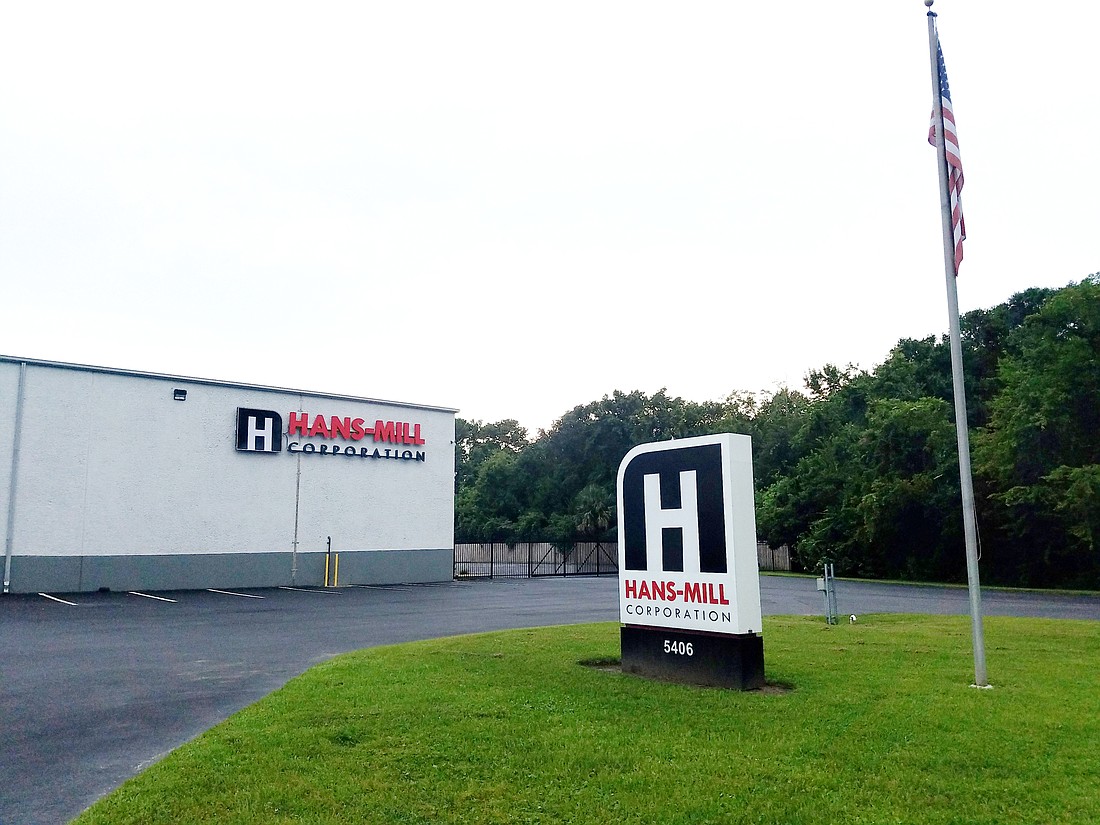
Hans-Mill Corp., which expanded from China to open a Northwest Jacksonville factory in May 2017, already needs more space.
In addition to the factory it owns, it will lease a 96,000-square-foot warehouse space about a half-mile north for storage and distribution.
There’s more.
“Hans-Mill is only the beginning of the planned investment,” said Managing Director Wolfgang Schau.
“If Hans-Mill’s concept is successful, the owner intends to build up to three more manufacturing facilities in the U.S., geographically distributed to optimize transportation to the consumer,” he said. That work would start in two to five years.
James Han is the owner. Schau said Han is based in Pine Brook, New Jersey, and has been planning to relocate the corporate offices to Jacksonville in two to three years that would involve 50 people to start.
Schau said the company will lease warehouse space at 1550 Ellis Road N. to distribute the stainless steel trash cans and storage totes it makes at property it owns at 5406 W. First St.
“We needed more warehouse space for our operation,” Schau said by email.
He said the lease is a temporary solution to provide the additional space. “Ultimately we may buy or build another building for our long-term needs,” he said. Schau said there is no specific building yet.
But the 25 percent tariff imposed on steel imports by the Trump administration might affect those plans.
Schau said the company sources as much as possible from domestic manufacturers but no U.S. manufacturer can provide all the steel components needed for its trash can production.
“Some of the raw materials, in particular the stainless steel components, we still have to import,” he said.
“They all refer us to Asian manufacturers in China, Taiwan and South Korea.”
Schau said the steel tariffs are “a big problem for us.”
He said that margins are tight in the retail market and a 25 percent tariff on one of the major components is significant.
“Ironically the tariffs are meant to support domestic manufacturers but having the opposite effect for us and many other manufacturers depending on imports of raw materials and components,” he said.
Schau said Han invested in Hans-Mill to bring manufacturing jobs back to the U.S. and to be near consumers to save transportation costs “and to reduce the carbon footprint.”
“The tariffs put these jobs in jeopardy and in order to survive, we may have to move production to Asia,” he said.
Schau said the stainless steel trash can production is impacted by the 25 percent tariff and may have to be moved outside of the U.S. “The storage tote production, not yet,” he said, unless more tariffs are imposed.
“Nobody knows where this trade war is going to, and when it will, end,” he said.
The totes are made of polypropylene. Depending on the color, Hans-Mill uses recycled or virgin polypropylene.
In the meantime, Schau said the Ellis Road warehouse space also will be used for other imported goods from its sister companies.
In addition to the products Hans-Mill makes in Jacksonville, it also imports and distributes goods for its sister companies, J&H International, based in Pine Brook, and CY Top Ltd., based in Hong Kong.
Schau said they import kitchenware, flatware, cookware, housewares and barbecue equipment.
Hans-Mill, CY Top and J&H sell to major retailers such as Walmart, Sam’s Club, Target, Home Depot, Family Dollar, Williams Sonoma, JCPenney and BJ’s Wholesale Club.
Schau said Hans-Mill has 57 Jacksonville employees, including those needed to operate the distribution warehouse.
Hans-Mill applied for a certificate of use for the space for the manufacturing and distribution of housewares.
Ellis Road landlord Sam Easton, of Easton, Sanderson & Co., said the space previously was used by CIL Forwarding, a logistics company.
A plan filed with the application shows that the Hans-Mill space will lease the 96,000 square feet within a 216,000-square-foot building at North Ellis Road and Fifth Street. The other tenant is shown as Alpha Packaging.
Hans-Mill bought the 120,000-square-foot West First Street property in June 2016.
City Council enacted an ordinance for a $200,000 Northwest Jacksonville Economic Development Fund grant for Hans-Mill to create 23 jobs by June 30, 2018, and invest almost $11.8 million for the real estate, machinery and IT equipment at West First Street.
City spokeswoman Tia Ford said the grant has been paid because the company met the requirements of opening the facility and creating the jobs.
Schau said it started mass production at the West First Street plant in July 2017. “We are still in the startup phase, even so it was a running start,” he said.